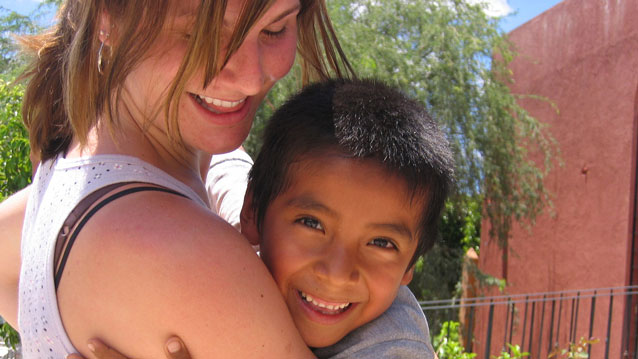EVANSTON, Ill. --- A second-year resident at Massachusetts General Hospital, Colleen Fant continues to draw on her Northwestern University study abroad experience in Mexico City seven years after the fact.
Fant, a 2008 graduate of the Weinberg College of Arts and Sciences at Northwestern, said addressing the health needs of patient populations -- both in Boston and Mexico -- requires more than a top-notch classroom education.
“A huge part of my education at Northwestern was learning about health beyond science and math, and Northwestern is really good at teaching science and math,” Fant said. “But there is much more to it. My training in Mexico provided cultural and historical context and background in addition to the practical experience.”
After a six-year hiatus, the program that gave Fant her first taste of health care from a global perspective is back on the study abroad roster with a $25,000 boost from one of President Barack Obama’s signature education initiatives.
The 100,000 Strong in the Americas Initiative -- created to increase study abroad within the Western Hemisphere -- is funding a collaboration between Northwestern and Universidad Panamericana (UP) to allow students from both universities to study obesity and nutrition in Chicago and Mexico City.
“The grant will allow us to enhance the program so that students learn about public health in our local community -- right here in Chicago -- as well as in Mexico City,” said Kim Rapp, associate director of International Program Development (IPD). “The opportunity to learn about obesity in the Americas generally, by using these cities as case studies, will help students approach the epidemic as a shared crisis to be addressed across borders, rather than a problem to be solved outside the U.S.”
The grant will enable Northwestern to provide round-trip airfare for NU students going on the Public Health in Mexico program, as well as for UP students traveling to Northwestern to attend workshops on obesity, nutrition and physical activity, before the two groups join forces to undertake the research phase in Mexico.
“The grant will allow us to make the program even more robust than it otherwise would be, with both sets of students learning that our communities face many of the same challenges in the areas of obesity and nutrition,” Rapp said.
Those attributes make the program a key opportunity to foster intercultural understanding by emphasizing the intersection of issues abroad and at home.
The 100,000 Strong in the Americas grant, along with a number of new, need-based, summer scholarships administered by IPD, will also make it possible for more Northwestern students to participate in study abroad programs.
“We are hoping to break any financial barriers students may face in their quest to study abroad,” Rapp said.
Study abroad, which is often touted as “life-changing,” should be an option for more students, she said.
For Fant, the Public Health in Mexico program cemented her interest in global health, which later took her to Ghana to develop a sexual and reproductive health education project at a health center through a Northwestern student organization called GlobeMed.
Fant was among the last NU students to participate in the Public Health in Mexico program.
Northwestern put the program on hold in 2009 following an outbreak of the influenza strain commonly referred to as “swine flu” in Mexico. The program was subsequently delayed further by travel warnings related to safety concerns.
Now, with the $25,000 grant and the green light from University safety and security officials, the program is back in full swing.
Students have until March 1 to apply for summer session study abroad programs and financial aid.


